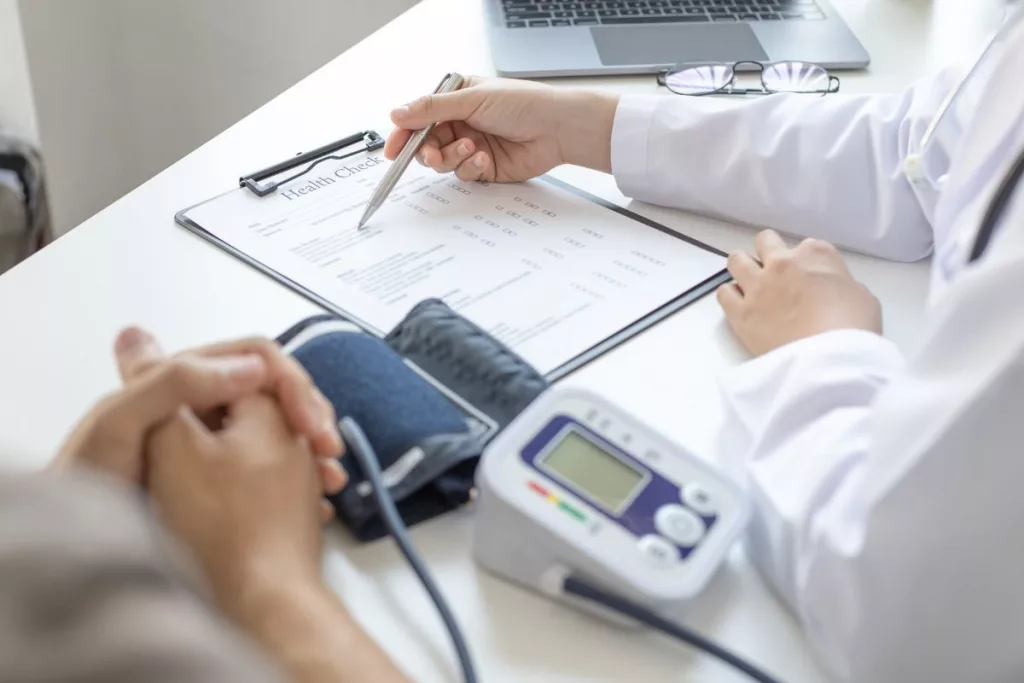Infectious disease doctors play a crucial role in diagnosing, treating, and preventing various infectious diseases.
With their extensive expertise, these medical specialists can identify the causes and mechanisms of infectious illnesses, enabling them to provide accurate diagnoses and develop effective treatment plans.
An infectious disease is a subspecialty in the medical field, with specialist doctors and experts working on treatments and cures.
Infectious disease specialists are experts in diagnosing, treating, and curing a range of diseases caused by viruses, bacteria, parasites, and fungi.
From COVID-19 to MRSA and HIV to pneumonia, UTIs, surgical site infections, ticks, mosquitos, and wounds, infectious diseases can occur anywhere in the body.
An infectious disease doctor’s job is to help fight such diseases, whether they be in an outpatient setting, wound and infusion centers, or their own offices.
This way, patients do not need to be admitted to hospital for treatment.
To find out more about what an infectious disease doctor is, and what their responsibilities are, we have compiled this helpful article.
We will explore their role in diagnosing and managing infectious diseases, including conducting thorough evaluations, ordering diagnostic tests, and prescribing appropriate medications.
Furthermore, we will discuss their involvement in public health initiatives, such as preventing outbreaks, developing vaccination strategies, and advising on infection control measures.
An Infectious Disease Doctor Overview
With their in-depth knowledge of infectious diseases, infectious disease doctors serve as essential resources in the field of medicine, collaborating with other healthcare professionals to combat and control the spread of infections.
These medical professionals treat illness anywhere in the body. These illnesses are generally caused by microorganisms, such as viruses, bacteria, parasites, or fungi.
Such diseases can be contracted from other individuals, animals, ticks, insects, or the environment.
All in all, there are four main categories of care that infectious disease doctors are responsible for:
Infectious Disease Care
Specializing in infectious disease care, these specialists prioritize the use of minimal medication necessary for optimal and safe outcomes in patients dealing with viral, bacterial, fungal, and parasitic infections.
Their expertise ensures effective treatment while minimizing potential risks and maximizing the success of patient outcomes.
Wound Care
Wound care encompasses various treatment approaches, such as the use of antibiotics, wound closures via a vacuum technique, antimicrobial dressings, and various types of topical agents.
Also, hyperbaric oxygen therapy serves as another strategy, involving the inhalation of pure oxygen within a pressurized chamber to enhance the supply of oxygen to the lungs and support the healing process.
Travel Care
This entails vaccinations as preventative measures toward diseases such as whooping cough, Tetanus, and hepatitis A and B.
Infectious disease doctors can also treat illnesses that came about during traveling, such as malaria, Dengue fever, and tuberculosis.
Infusion Care
Patients are cared for in an outpatient setting with treatments including antibiotics, hydration therapy, antifungals, iron therapy, immunoglobulins, steroids through IV infusion, and osteoporosis therapy.
In a time when international travel is common, infectious disease doctors are vital in treating illnesses acquired when traveling abroad.
Additionally, the COVID-19 pandemic, a progressive struggle with drug-resistant bacteria, and significant advancements in treating chronic infections like hepatitis C or HIV, mean infectious disease doctors are becoming increasingly important in communities worldwide.
Main Conditions Treated By Infectious Disease Doctors
The conditions treated by infectious disease doctors tend to have a myriad of different causes and have the ability to affect different parts of the body.
The most common conditions treated by these medical professionals are:
- Pneumonia – Other respiratory infections treated include bronchitis, and respiratory syncytial virus (RSV) infections.
- Clostridium difficile (C. diff) – Another hospital acquired infection treated is MRSA (methicillin-resistant Staphylococcus aureus)
- HIV – Other viral infections that are treated included influenza (flu), herpes, and COVID-19.
- Diseases carried by mosquitoes or ticks – These include malaria, Lyme disease, intestinal parasites, and tropical diseases.
- Sexually transmitted diseases (STDs) – Chlamydia, gonorrhea, and syphilis can also be treated by ID doctors.
- Urinary tract infections – Many bacterial infections can be treated by ID doctors, such as tuberculosis and bacterial meningitis.
- Wounds that fail to heal, or wound infections – Skin and soft tissue infections, such as cellulitis, abscesses, and necrotizing fasciitis are also treated.
- Hepatitis B and Hepatitis C
- Skin infections
These are just a few examples of the conditions that infectious disease doctors diagnose, manage, and treat.
Their expertise extends to various infectious diseases, and they play a vital role in patient care and public health efforts.
Preventative Treatments Offered By Infectious Disease Doctors
As well as providing treatment to patients who are sick, infectious disease doctors also provide extensive care with a goal of preventing the illness in the first place.
Over the last decade or so, ID doctors have been caring for more travel-related illnesses. This is due to more people taking trips abroad than ever before.
The more people travel, the easier diseases can be spread, as seen during the COVID-19 pandemic.
On top of providing post-travel care and treatment to those who have contracted infections like malaria, ID care doctors also administer vaccines in some cases.
These vaccine programs mean ID doctors are often required to visit some countries and can include inoculations to fight against lesser known exotic diseases, such as yellow fever or Japanese encephalitis, and meningococcal disease.
For anyone traveling to a developing country, antibiotics should be taken along. Infectious disease doctors will also advise their patients over these medications, too.
In addition to their medical responsibilities listed above, infectious disease doctors provide guidance and counseling to individuals engaging in high-risk sexual behavior.
They also offer short-term post-exposure treatment with HIV drugs to prevent viral transmission.
Similarly, in cases where healthcare workers have experienced accidental injuries from needles, these specialists provide necessary testing and appropriate treatment.
Overall, infectious disease doctors play a crucial role in addressing and managing potential risks and exposures in various settings.
Are Patients Treated By Infectious Disease Doctors In Hospitals Or Offices?
In most circumstances, infectious disease doctors treat their patients in both inpatient settings, such as hospitals, and outpatient settings, such as offices.
By treating patients in hospitals, these doctors can stand the best chance of preventing and managing infections acquired in a hospital environment. These include infections from surgical sites.
Whilst in hospital, ID doctors can help direct the necessary treatment of those who have developed infections such as pneumonia or sepsis.
Moreover, detailed infectious control plans can be drawn up and implemented in hospitals, so infectious disease specialists can take the best, most successful preventive measures possible.
Preventative measures may include the assurance of the appropriate use of antibiotics to prevent the development of drug resistance and infections like C. diff.
ID doctors also play a crucial role in managing outbreaks of MRSA by implementing measures to isolate affected patients and identifying and eliminating the sources of the pathogens.
In the most difficult cases, it is now standard procedure to involve infectious disease specialists.
Their expertise can help make patients feel safer and protect them against any possible complications that could lengthen their stay at hospital.
As well as treating patients and getting them back to full health, ID doctors also help build a better quality of life for those affected by serious diseases.
Some patients will be treated in an ID doctor’s office. In these outpatient facilities, the doctor will consult with the patient, diagnose, and treat conditions, including HIV, Lyme disease, CODI-19, hepatitis B and C, wounds that refuse to heal, and recurring urinary tract infections or sinusitis.
Can You Avoid Hospital By Seeing An Infectious Disease Doctor?
The way patients are treated for certain conditions has changed over the years.
Once, those who suffered from skin and/or soft tissue infections, urinary tract infections that were resistant to drugs, or pneumonia were admitted to the hospital for up to two weeks.
There, they would receive antibiotics via IV.
Today, infectious diseases doctors and specialists treat patients suffering from the same or similar conditions with the same drugs but through infusions.
These are generally administered at outpatient infusion centers, such as the doctor’s office. The infusion will be given in the morning and the individual can then continue their daily regimen as normal.
This new method is far more convenient for both doctors and patients. It gives those suffering from certain conditions the advantage of living a normal life, rather than spending weeks at a time in a hospital bed.
Of course, those who are very sick will require further treatment and hospital stays.
It is also vital to keep high-risk patients who live in nursing homes away from hospitals when possible.
This is particularly important for older parents, as they often experience physical and mental deconditioning when staying in hospital.
Therefore, ID doctors try their best to visit patients in nursing homes and treat them on the spot with medications, like IV antibiotics.
If a patient requires an invasive procedure or surgery, such as kidney stone removal or a cystoscopy, it is essential that the process is planned ahead with an infectious disease specialist.
This can help lower the risk and even prevent infections that could result in a longer stay in hospital.
To prepare for a serious procedure, ID doctors can administer the appropriate antibiotics and medication.
This can help manage any bacteria that may already be present in the patient’s body. In the end, this could be a matter of life and death.
When Is It Time To See An Infectious Disease Specialist/Doctor?
It’s quite simple when to know the right time to see an infectious disease doctor. If you are sick and are not getting better, or your symptoms worsen, you should consider visiting an ID specialist.
A common example is someone who has been suffering from a urinary tract infection, taken a few courses of antibiotics, but still is not seeing any improvement in their condition.
This also applies to individuals whose cough has not improved after a course of antibiotics, or whose wound has not healed after a month of prescribed treatment.
In cases such as these, you should not wait any longer. You should seek medical assistance from an infectious disease specialist immediately.
The earlier you visit a doctor, the more they can offer treatment wise.
There are other important reasons you may need to visit an infectious disease doctor. Some of these include:
- International travel (especially to developing countries)
- Autoimmune diseases
- Unexplained fevers or wounds
- Chronic illnesses, such as hepatitis B, hepatitis C, or HIV.
Today, medical advancements mean infectious disease doctors can now treat chronic illnesses, like those listed above, with a pill, rather than an injection.
For patients with HIV, primary care doctors like to treat the condition. However, it is highly recommended that these individuals consult with an infectious disease physician, as well.
Thankfully, HIV is extremely manageable in the current age, but there are brand-new treatments being introduced and guidelines can change quite frequently.
By seeing an infectious disease doctor, they can give you the most up-to-date exact care and treatment required for a certain condition.
Do You Need To Visit An Infectious Disease Doctor If You Have COVID-19?
If you contract COVID-19, it is advised that you seek medical assistance from an infectious disease doctor. Upon being evaluated, they can test you for the condition if any symptoms are present, and then treat you accordingly.
Infectious disease specialists have monoclonal antibodies in their offices that are used to treat patients with COVID-19.
These are not available through the majority of doctors. Instead, they will typically send a patient to the emergency room for further medical aid.
In serious cases of COVID-19, it is essential to act quick. If you see an ID doctor within the first ten days of symptoms, they can care for you with treatment not available with primary care doctors.
Out of all doctors, infectious disease doctors have the most experience when treating COVID-19 infections.
Remember, this disease is still new in the world, meaning treatment for it is evolving at all times. ID doctors work with conditions, such as COVID-19, on most days.
Therefore, they are up-to-date on the most current guidelines; something primary care doctors may not be.
How Are Infectious Disease Doctors Different To Other Doctors?
There are numerous areas in the field of medicine that distinguish infectious disease doctors from their contemporaries and colleagues in other specialized medical fields.
Many of these areas link to an ID doctor’s thorough understanding of the whole body, which is necessary as infectious disease can strike anywhere in the body.
Here are the main area in which infectious disease doctors differ from other providers:
They Understand Infections
Unlike generalist physicians or medical specialists who may primarily treat infections with antibiotics and observe patient improvement, infectious disease doctors take a different approach.
They delve into understanding the underlying reasons for the illness.
For example, if there is an immunodeficiency, it is essential to identify and address it to prevent recurring infections.
Driven by a focus on the root cause, these specialists investigate factors contributing to issues like recurrent urinary tract infections or unresolved pneumonia.
By targeting the underlying cause, infectious disease doctors aim to implement effective strategies that halt the cycle of illness and promote healing.
They Have Up-To-Date Knowledge On Treatments
A top infectious disease doctor stays updated with the latest advancements, treatment protocols, and therapies, leading to improved patient outcomes for individuals facing health issues related to infections.
As an example, ID care can provide a new injectable medication for convenient week-long treatment of skin and soft tissue infections.
Additionally, the expertise of ID care specialists in navigating health insurance systems can help manage medication costs for patients undergoing hepatitis C treatment, which would otherwise be very expensive.
Access to cutting-edge knowledge and a patient-centered approach are key components of the best infectious disease doctors.
They Offer Expertise On Travel Care
Infectious disease doctors are the best at giving guidance to patients before they jet off around the world.
Because their knowledge of preventative treatment via the prescription of antibiotics or inoculation is so profound, they can prescribe the correct, and best travel medicine for particular instances.
They Are Conservative When Prescribing Medication
You may think that infectious disease doctors prescribe more medicine than primary care doctors, but the truth is quite different.
ID specialists tend to be far more conservative when prescribing antibiotics compared to other specialists.
In recent years, resistance to antibiotics has caused grave concern in the medical community. Experts believe this is down to antibiotics being too readily available.
If patients continue to take such medication when it’s not needed, they will eventually become resistant to antibiotics.
ID doctors understand how crucial it is to avoid resistance on a mass population scale. If this occurs, it will become extremely challenging to treat those who are suffering with infectious diseases.
How Do You Find A Qualified Infectious Disease Doctor?
If you feel you need to see a qualified infectious disease doctor, you can start by asking for referrals from your primary care physician. Another way is to seek recommendations from trusted sources.
Additionally, you can contact local hospitals or medical clinics for information on infectious disease specialists in your area.
In Summary
Infectious disease doctors are crucial when it comes to diagnosing, treating, and preventing a whole range of infectious diseases and conditions.
If you would like to find out more about infectious disease doctors, it is always recommended to consult with a qualified healthcare professional for personalized medical advice and information.









